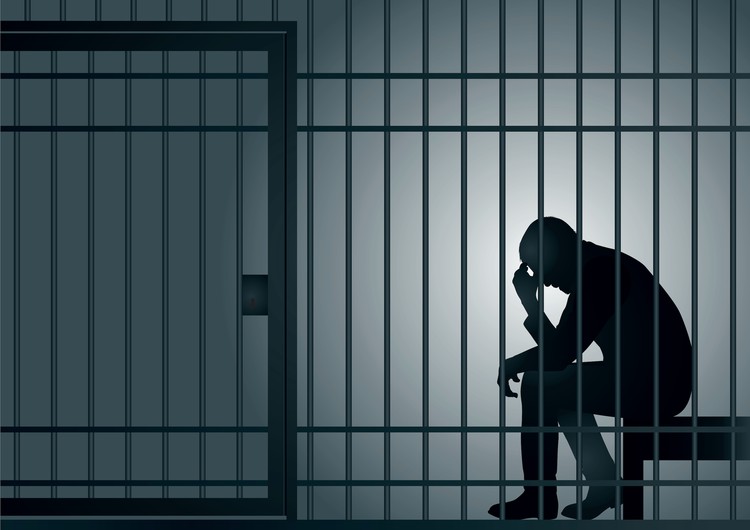
30 March 2022
There is a massive backlog of parole considerations for prisoners with long sentences. Photo: Royalty-free stock vector ID: 1349712146 By Pictrider via Shutterstock
For years, prisoners sentenced to life imprisonment – “lifers” – have complained about the long delays in accessing consideration for parole. GroundUp has reported on hunger strikes by lifers and their demands for parole hearings.
Prisoners say the unjustifiable delays result in many lifers spending more years in prison than is appropriate. The Judicial Inspectorate for Correctional Services (JICS) agrees.
JICS spokesperson Emerantia Cupido says, “Although parole for any sentenced inmate – including lifers – is not a right, parole consideration is. Inmates can approach the court to try and compel the minister to consider parole.”
According to the Department of Correctional Services, lifers are eligible for parole once they reach their minimum detention period. A person sentenced to life imprisonment before 1 October 2004 must serve 12 years and four months before being considered for parole. If they were sentenced after 1 October 2004, they need to serve a minimum of 25 years.
Offenders’ profiles are forwarded to the Correctional Services and Parole Board by the Case Management Committee for consideration three months prior to reaching the minimum detention period. There is no prescribed period for a decision on the parole consideration, according to Sechaba Mphahlele, media liaison officer for the Department of Correctional Services.
The parole board sends the lifers’ files and its recommendations to the Minister of Justice and Correctional Services for consideration, he said.
The minister makes the final decision. “It should be noted that the Minister considers each case on an individual basis,” said Mphahlele.
This process has created a log jam on the Minister’s desk.
In its 2020/21 annual report, JICS said it was “experiencing an overload of complaints about parole, especially for lifers”.
According to the report, of the 17,188 people serving life sentences, 4,494 were eligible for parole consideration. Only 36 lifers were granted parole that year, indicating a “crisis” in the process.
It would take the minister 409 days to clear this backlog if he worked for seven hours a week on the lifer’s profiles, Justice Edwin Cameron wrote in an article. Cameron is the head of JICS.
Prisoner Adam (we are using a pseudonym), imprisoned at Westville Correctional Centre Medium B, was sentenced in 2002 to life imprisonment.
His cousin, Geaniel Ismael, said Adam has been waiting for more than a year for the minister’s decision.
In 2017, the Durban High Court ruled in favour of Adam’s application for the processing of his, and eight other Westville lifers’ parole with immediate effect. Because he was sentenced before 2004, Adam’s minimum detention period is 12 years and four months. He was recommended for parole by the Parole Board and his file was sent for approval in February 2021.
“My cousin has completed his sentence and he has spent an extra seven years and eight months in prison. He completed four additional [rehabilitation] programmes in six months and he has submitted the evidence required to prove that he is not a risk to the community and the victim, yet his parole application has been sitting on the minister’s desk for over a year,” she said.
After sending numerous emails and calling officials at the ministries of justice and correctional services, the Parole Board and the National Council for Correctional Services (NCCS) for nearly two years, Ismael said she was told by a member of the NCCS secretariat two weeks ago that Adam’s parole application will be “finalised soon”.
“When is soon? That is an indefinite reply,” she said.
Mphahlele said the department was aware that there were “sometimes delays regarding parole consideration and placements for lifers”. He said this was caused by outstanding records and reports; the completion of restorative justice processes (where applicable); and addresses to which lifers will be released being unverifiable.
He said that after the Phaahla judgment handed down by the Constitutional Court in May 2019, more lifers became eligible to be considered for parole, causing delays. The Phaahla judgment also means that parole is now determined by the date of commission of offence, for offenders serving life incarceration or determinate sentences who committed the offence before 1 October 2004 but were sentenced on or after 1 October 2004.
Mphahlele said task teams were established at national and regional levels to deal with delays in parole considerations for lifers.
Cupido said the Inspecting Judge is currently in the process of discussing the delays with the minister as well as the National Council for Correctional Services “to try and find a solution”.